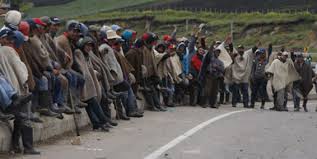Agrarian uprising against free trade and ’government lies’ sweeps Colombia

Common Dreams | Wednesday, April 30, 2014
Agrarian uprising against free trade and ’government lies’ sweeps Colombia
Second agrarian uprising in less than a year met with tanks, soldiers, and riot police
Sarah Lazare, staff writer
Agrarian strikes, protests, and road blockades are sweeping Colombia this week as peasants voice outrage at the "free trade" policies, backed by the Colombian government, that they say are exacerbating the country’s crisis of rural poverty.
"The countryside has been abandoned by the state in favor of big companies," Jimmy Torres of Conciencia Campesina in Cajamarca told The Guardian. "That’s why we block the roads and protest."
The second major mobilization of its kind in less than a year, the strike launched Monday and has so far been met with government tanks, troops, and riot police, The Guardian reports. Human rights organizations estimate that 200 participants have been "illegally arrested," Neil Martin of the Colombia-based labor solidarity organization Paso International told Common Dreams.
The strikes and protests are organized by dignity movements for potato, rice, and coffee growers and other rural workers, said Martin.
Peasants have levied a range of demands for greater social protections and relief from debt, mining projects, and "free trade" agreements that have bankrupted and displaced Colombia’s peasants, workers, indigenous, and Afro-Colombian communities.
The "U.S.-Colombia Trade Promotion Agreement," passed by U.S. Congress in 2011, slashed tariffs on U.S. exports to the country while prohibiting protections for Colombian farmers, forcing peasants and farmers to compete with an influx of subsidized U.S. products.
"The government would have to provide massive subsidies to these farmers for them to make ends meet, but the free trade agreement with the U.S., for example, prohibits this type of policy," said Martin. "Meanwhile the U.S. government provide massive subsidies to its agricultural industry. The globalization of the agricultural market, in general, also makes for a very volatile situation for small farmers everywhere who fall victim to unpredictable booms and busts."
In Colombia today, the overall poverty rate hovers at 30.6 percent, and in rural areas this figure runs 11 percentage points higher.
Cesar Pachon, representative for the Potato Farmers Dignity Movement, told newspaper El Colombiano that the protesters "are searching for a price control [or subsidy] because the potato is selling for less than its [production] cost, soft loans, debt refinancing and support for inputs because they are expensive,” according to a translation from Colombia Report.
Colombia’s ongoing mobilization follows a larger rural uprising and strike of hundreds of thousands this August that was met with severe repression from Colombia’s feared police, resulting in approximately 20 deaths. While the mobilization forced President Juan Manuel Santos to promise compliance with the protesters’ key demands, peasants say he has failed to follow through on his commitments.
“We have no faith in the central government,” said Walter Benavides, who is identified as a spokesperson for the striking farmers by the Miami Herald. “They’ve lied to us repeatedly... We don’t want words, we want actions.”
Numerous media reports state that the fresh protests less than a month ahead of the May 25th vote have the potential to upset Santos’ re-election bid.
Meanwhile, the rural protests are expected to spread Thursday, May 1st—recognized around the world as International Workers’ Day—with more organizations and supporters slated to take to the streets.





